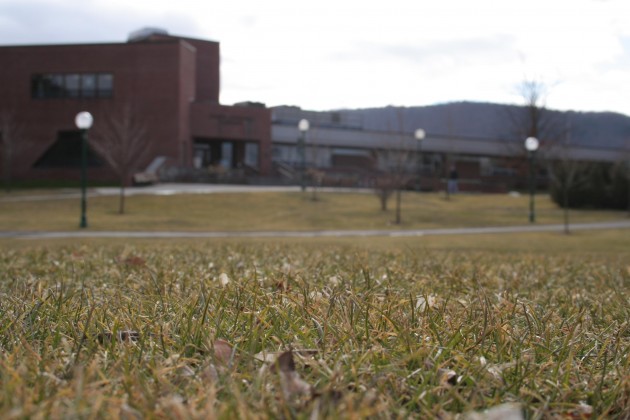Can we ban the bottle too?
The University of Vermont recently banned the sale of all plastic water bottles from campus and recycling leaders at Castleton State College say this campus should follow suit.
But Castleton students sometimes seem uninterested in making it a more environmentally friendly place with trash cans that overflow with plastics, even though recycling bins are just steps away.
Professor Paul Derby, who started the Green Campus Initiative in 2005, thinks banning plastic water bottles is a solid goal for students to aim for. But how does this idea become a reality?
“Students! The only way this could happen is if students get involved,” said Derby, adding that student involvement is one of the most difficult parts in getting a project underway.
But some students seem intrigued and excited about this idea.
“We need to actively educate people on campus about sustainability. If we start with small changes, those changes can grow over time,” said junior Caleb Kinney, treasurer of the Green Campus Club.
Derby agrees, saying the framework is already set up for more recycling to happen.
“Castleton has a great recycling system, it just doesn’t get used as often as it should,” he said.
If the sale of plastic water bottles was eliminated from campus, it would drastically cut waste produced each year. And because the college pays Casella to collect the trash, less trash means more savings, Derby said.
But there may be some roadblocks to the plan. Derby said Pepsi pays the college $20,000 a year to sell their products and endorse certain campus projects. Pepsi provided the scoreboards and vending machines on campus. And for every bottle of water sold, Castleton also gets a percentage of the profits. Most of the money is used for Residence Life on campus, officials said.
Another consideration is the sale of water during sports events like football games. Water would have to be available during games so the ban would impact only Fireside Café and The Coffee Cottage, said Scott Dikeman, chair of Sustainability Working Group.
Banning plastic water bottles would have some downfalls and students would have to be persistent. “Pepsi owns campus,” said Dikeman, adding that it isn’t as simple as ending the contract with Pepsi. He said everyone involved must be on board, including staff from other Vermont State Colleges because they buy Pepsi products together.
“It’s like buying something in bulk. The more people in on it, the cheaper it is,” Dikeman said.
But Dikeman said he likes the idea and is going to continue to work with students to move forward.
“I know it could work. Most people have their own water bottles and it would be so much better for the environment,” said freshman Chris Villa.
Not only would the environment benefit, but so may the students.
“I bring my own water bottle every day. I don’t have a meal plan, so I’m definitely not going to waste money
on bottled water,” said Molly Smith-Leach, a commuter and transfer student.
The ban would force other students and staff to similarly utilize reusable bottles, and this is being encouraged by a new water bottle refilling station that will replace the current dual water fountain in the Campus Center. This device will keep track of the water being used and saved, said Victoria Angis, assistant dean for Campus Life.
This project is within reach, but officials said nothing can progress further until the Pepsi contract is up for review in June 2013.
“If UVM can do it, so can we. AND we can do it better, because we have a smaller student population, meaning we could get 100 percent participation more easily,” Derby said. “I know that this would be great for our campus life. Students just need to realize how great it is, and get involved. They cannot be afraid to push the system.”






